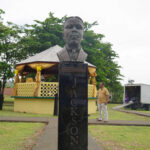
GROVE PLACE, ST. CROIX — The annual D. Hamilton Jackson Day observance in Grove Place on Saturday put three voices at the center of the program’s message: Delegate to Congress Stacey Plaskett urging action over passivity; Lieutenant Governor Tregenza Roach insisting on a free, uncensored historical record; and keynote speaker Percival Tahemah Edwards calling for legal and institutional stewardship of Jackson’s labor legacy.
Plaskett praised the Grove Place Action Committee (GPAC) and its new president, Jaynilah Williams, and acknowledged leaders in attendance. She framed the day as both commemoration and charge, tying Jackson’s 1915 trip to Denmark to “the creation of the Herald, our island’s first free press, and the declaration of this very day as Liberty Day, what we proudly call bull and bread day.”
Plaskett stressed Jackson’s labor organizing and its modern relevance. She thanked union members present and said his fight was “not only freedom from oppression, it was always empowerment through education, labor rights, community actions.” Each time she advocates in Washington, she said, she carries Jackson’s insistence on equal treatment for Virgin Islanders: “His courage to speak truth to power reminds us of an enduring truth. Liberty is not given, it is earned and defended every day.”
Warning against silence amid eroding rights, Plaskett argued that Virgin Islanders should not settle for “crumbs.” “Seven nations have taken from us,” she said, and that “very little has been given back. It is for us to take what is ours, not to wait for anyone to give it to us, not for handouts.” She closed with an exhortation to act rather than wait.
Lieutenant Governor Tregenza Roach thanked GPAC for pressing ahead “whether in times of beautiful sunshine or times of beautiful rain,” then connected his background in journalism to Jackson’s free-press struggle under Danish and naval rule: “There was no free press… and he wanted to ensure that somewhere, somehow, some unfiltered amount of information that spoke to the real conditions under which people lived would come to those people unedited and uncensored.”
Roach warned that today’s battles are about what is taught and preserved: “Our the telling of our own history is under attack by the political forces of this country… who have set upon museums, who want to strip museums of their content… and curriculum… so that children do not learn about their history.” He told attendees that the duty now falls on them: “At some point, you will become responsible for your own education, your own information, and on learning that information, sharing it with someone.”
Offering starting points, Roach named resources such as Small Islands, Large Questions, Commoner Folk (VI Humanities Council), The Umbilical Cord (Justice Harold Willocks), Yellow Cedars Blooming, Seasoning for the Mortar (edited by Marvin Williams), and Engaging Freedom’s Journey VI (Sele Adeyemi Donovan).
Keynote speaker Percival Tahemah Edwards situated the tribute in a 110-year timeline since the Herald’s first printing — “whoever today is in the David Hamilton Jackson Park is part of history” — and moved through a dense survey: emancipation and Fireburn, colonial statutes, and Jackson’s life in the Moravian tradition, education, and early public service. He narrated Jackson’s 1915 lobbying in Copenhagen during World War I, the Herald’s publication, and organizing around “better wage and better living conditions.”
Edwards said Jackson supported the transfer from Danish to U.S. rule, studied the Constitution and amendments, and pursued law — describing him as passing the bar in Indiana in 1919 — before service on the Colonial Council, appearances before Congress tied to Virgin Islands citizenship (“President [Calvin] Coolidge… signed the document”), a judgeship under President Hoover, and work on the Municipal Council.
Turning to Grove Place, Edwards linked estates and the St. Croix Labor Union’s assets to community ownership and urged practical steps now. He asked GPAC to “have an office right in this building,” to seek legal guidance, and to “protect the descendants of St. Croix Labor Union and David Hamilton Jackson assets… for the rest of the 21st Century.” He pushed for broader storytelling: “We need a Netflix movie… Liberty Day, David Hampton Jackson Day, Bull and Bread day.” The goal, he said, is for Virgin Islanders everywhere to see themselves and their history preserved and accessible.
Amid the main addresses, former GPAC president Raymond Williams formally passed a symbolic torch to Jaynilah Williams, who accepted “with an awesome team behind of me.” The moment underscored the through-line of the day: the story of D. Hamilton Jackson is not just remembered — it is reassigned, with expectation. The speakers’ collective message was clear: defend a free press, honor labor dignity, learn and teach the history, and build the structures — legal, institutional, and cultural — that will keep the work grounded in Grove Place and visible to the world.
British Caribbean News


